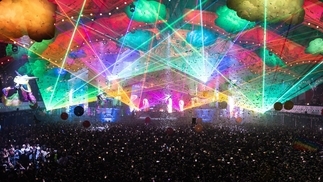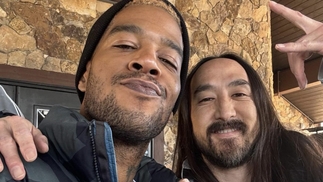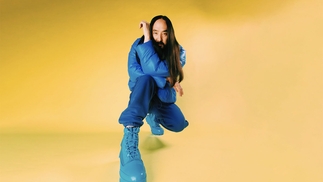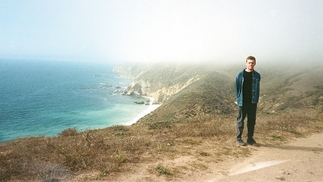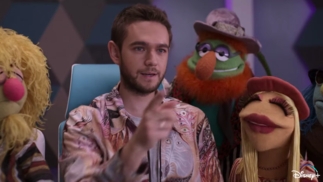STEVE AOKI: HAVING HIS CAKE AND EATING IT
Steve Aoki is the EDM superstar that fans adore and haters love to hate.
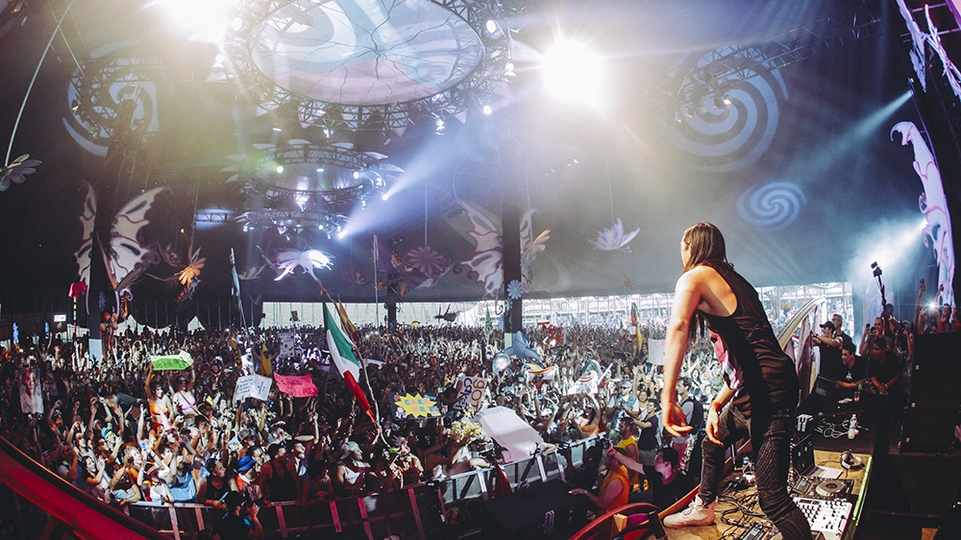
He’s built a musical empire on DiY ethics, hard work, punk rock drive and lots and lots of cakes. As he prepares to headline the DJ Mag Miami party this month, we investigate whether it's possible for the Dim Mak man to please the public AND satisfy his deeper creative drive...
He’s talking about his signature stage gimmick, of course. Aoki has become infamous for flinging cream cakes at eager punters when he performs live at festivals around the world. They’re desperate for a chance to be caked to his sugary recipe of saccharine melody, aggressive noise and hard beats. But the whole cake thing is starting to wear on the EDM magnate a bit. It’s a dilemma. He wants people to focus on his music but he’s quite aware he needs to satisfy the demands of his fans, too.
“I have to think to myself, I’m here to spread my music to the masses,” Steve tells DJ Mag. “Now there’s the goal from the fan perspective, they only know one song. So as long as you play ‘Pursuit Of Happiness’, or ‘Boneless’, or ‘No Beef’, whatever it is, that’s really all I want to hear — and I want to get the cake. My selfish goal is, I wanna play ‘Home We’ll Go’, these other songs, the three new songs I just wrote ’cause I want to get a reaction from the crowd and hear it through a system. So the cake is no longer a selfish thing, it’s become... I’m necessitating a demand. You want it, I’ll give it to you. Sometimes it’s like, ‘Yeah, the guy’s still throwing fuckin’ cakes, what the fuck?’ I did a couple of shows where I didn’t throw any cakes and it was awesome!”
It’s safe to say Aoki wants to have his cake and eat it, too. It’s a dichotomy that says a lot about the conflict between his current stage persona and his musical roots. Nowadays the Los Angeleno, 38-year-old Japanese-American artist — son of hugely successful restaurateur Rocky Aoki, who founded the Benihana chain — presides over an empire of his own. He’s a DJ of course, but also a record producer, remixer and the canny label owner of the Dim Mak imprint (the name means ‘death touch’ in Chinese and refers to a legendary, lethal martial arts technique), now celebrating 20 years in operation. He’s built a reputation as a prolific creator of EDM anthems, big bombastic tracks designed to demolish US festivals.
They’re tunes made to push all the right buttons; the work of an artful musician. ‘Get Me Out Of Here’ with Flux Pavilion from his ‘Neon Future I’ album is a breakbeat-laden proton megablast of tranced-up brostep madness while his new hip-hop track ‘How Else’ with respected rappers Rich The Kid and ILoveMakonnen is an inventive and credible stab at trap.
But Aoki also embodies what some people believe to be the worst facets of EDM. For every adoring fan — and there are many, enough to consistently vote him into the upper reaches of the DJ Mag Top 100 DJs poll — there’s a grudge-bearing underground curmudgeon who sees his pyrotechnics and cream confectionery-based performances as anathema to what dance music is about. Many in his position wouldn’t care about the haters, but it’s still a little galling for Aoki, especially when you consider where his original musical priorities lay.
STRAIGHT-EDGE
Though today he’s playing the biggest stages across the US, Europe and Asia, collaborating with famous singers, rappers and bands, he got his start in hardcore punk rock and the band This Machine Kills in the late ’90s while living in his hometown of Newport Beach, California.
“When I was an impressionable kid...” Aoki says, “I was an Asian kid in a suburban white neighborhood. I didn’t really fit anywhere. I tried to play football, tried to do this and couldn’t really fit in with popular kids. I found these skater kids and got a mixtape of Fugazi, Minor Threat, and the lyrics spoke to me, like ‘You can do this’, ‘Break down the walls’, ‘We can do this together’. These kids don’t care about what people think, they’re skating and doing other shit, they’re putting on shows. That’s what I learned from that. A small community getting together and giving each other hope.”
The spirit of independence Aoki garnered from this part of punk, specifically the straight-edge movement that eschews drugs and alcohol, was ironically as underground in ethics as it gets. Part of his own band and fully immersed in the culture, Aoki thrived on hardcore’s DiY ethos.
“The most important thing I got from the straight-edge world is that it’s not about what you do or how you gain cool points. It’s not about what car you drive or the best bike you have, the hottest girlfriend. It’s what you produce in the community. If you do a 'zine [a self-produced fanzine/magazine], interview bands, and you’re out there and you’re passing the 'zines out, you’re cool. It pushed people to do that. You go to these shows and you see these bands perform, you want to start a band. And then you’re doing your first shows, that’s cool, you actually did something which exemplifies the culture of the scene. That behaviour is the most important thing I learned from the straight-edge lifestyle. You gain so much more by producing and being creative.”
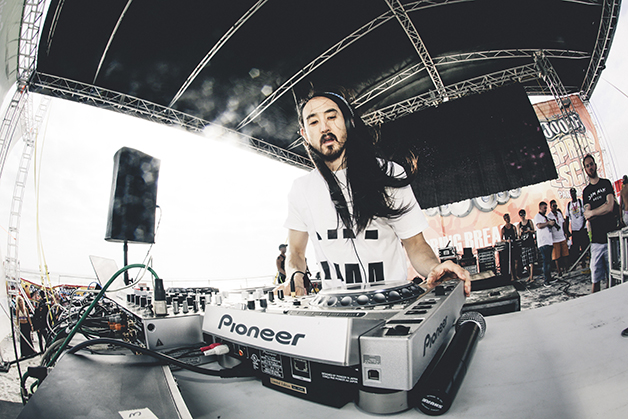
PUNKY
Inspired by this punk rock stint and taking note of his father’s astute business acumen, Aoki launched Dim Mak. To start with, it was an outlet for cool indie bands — Bloc Party, The Kills; the kind that rose during the post-punk revival of the early 2000s — before the label boss’s tastes were gradually attuned to the similarly punky and spiky, though more danceable sound of electro.
“We started a really cool cultural underground scene of hipsters, of kids who listen to indie music that wanted to hear hip-hop, wanted to hear LCD Soundsystem,” he says. “That’s when I started DJing in LA and I was doing it all the time, three days a week, and I’d have the Yeah Yeah Yeahs or The Mars Volta or The Shins or The Killers, Bloc Party come and DJ. Then in 2005, fast-track two years of having this burgeoning scene happening, I decided to learn how to produce remixes. I worked with a friend of mine who was also in a band, and he taught me how to use Pro Tools. We started a group together called Weird Science and he trained me for two years. We did probably 30 or 40 remixes. I learnt how to produce in the box. Understanding how to produce outside of being in a band, outside of being in that space.
“It really felt like the punk state of electronic music.” he continues. “It fuckin’ stuck in my soul, I thought, ‘This is exactly where I belong, my identity is forged into electronic music in a really symbiotic way from where I came from’.”
As Aoki’s tastes changed, the cultural landscape of the United States changed too. Where once his Justice and MSTRKRFT-styled electro beats — and still heavy, rave hoover-powered collaboration with Bloody Beetroots, ‘Warp’ — were the preserve of crusty Converse-wearing electro-punks, the dawn of the EDM machine was just around the corner. As dance hit the mainstream in America again — this time far more strongly than it had when acts such as Fatboy Slim, The Prodigy or The Crystal Method rode the wave in the ’90s — it ushered in the hugely popular and more commercial hybrid festival sound rightly or wrongly christened EDM. What started out as simply a catch-all term to describe any kind of 'electronic dance music' has become a handy and now widely-used epithet to denote a very particular sound, one that Aoki has clearly been influenced by. Still, though his music has gone in a far more commercial direction as his shows have become more expensive and elaborate, he’s keen to point out that the punk sound is still very much part of his musical make-up.
“I produced ‘Misfits’ for [US punk band Blink-182’s drummer] Travis Barker’s album, I wrote all the guitars, sampled my guitars, produced the entire beat, I sang on it, I screamed all over it and Travis played drums on it for his album. I also did ‘The Kids Will Have Their Say’ on ‘Wonderland’ in 2012 where I produced the song with Sick Boy, this Dutch producer, who also shares the hardcore punk past, he was able to get Big John from [Scottish punk legends] The Exploited to play guitar. I sang on it and then we produced it. A lot of that stuff fell on deaf ears as far as the electronic community, it’s not remembered like ‘No Beef’ or something like that. But I always try to find ways to keep my roots in the style of music when it made sense. I don’t do it every song, but I try to have a place for that.”
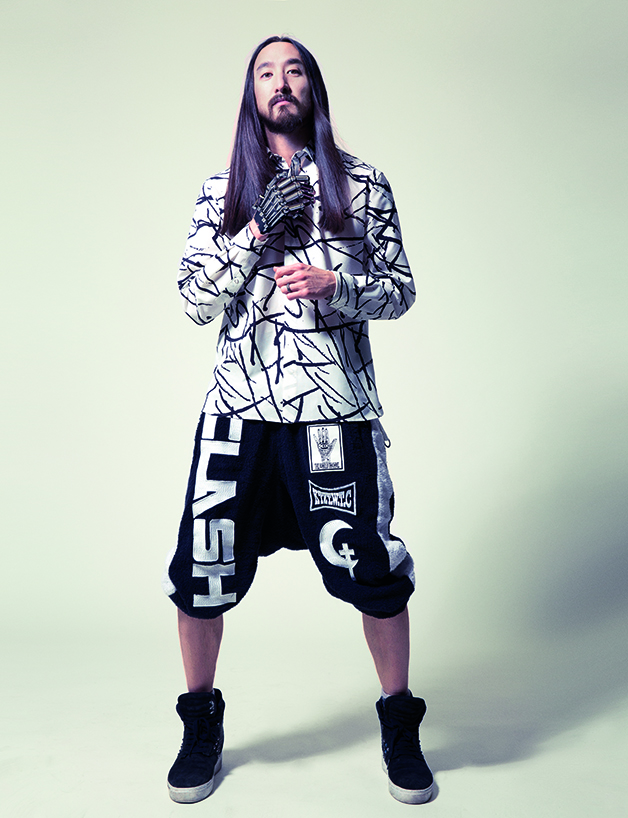
NEGATIVE
Aoki’s live shows at festivals have made him a poster boy for EDM. To his fans, the cake throwing and more outlandish production elements of the shows — such as arm-mounted, robotic Co2 ice cannons — are a spectacle, unabashed fun. But it’s made him a very visible target for the self-appointed guardians of house and techno, who see him as a figure without musical integrity, worthy of ridicule. When asked about how he’s perceived by the underground, Aoki bristles a little. But his response is measured and difficult to argue with.
“It’s an opinion. People are gonna say whatever they feel,” he shrugs. “What can I do? Should I curl up and die somewhere? (laughs). It’s just how it is, it’s like how the East Coast hates on the West Coast, New Yorkers hating California is very normal. What is California gonna do, sink their state into the ocean? It is what it is. It’s unfortunate that there’s a strong negative sentiment against something.
“The term EDM is such a funny term, it’s such a new term too,” he continues. “I think there’s two sides to this. I think EDM became a term when the news started saying, ‘What’s this crazy thing at festivals, DJs playing and lots of people going and there’s not even a band playing?’ I think it was created like that. And when it’s created like that, it’s not created from a small club in the underground in a city and it grew, like techno from Detroit or house in Chicago. It’s hard to rally around something like that anyways. It’s not like I’m rallying around EDM. Electronic music, I rally round that. I’m also proud that this music I’ve been a part of culturally, supported for all these years, has made it to the main stage of these festivals. I’ve been so fortunate, I’m so grateful to play the stages at these festivals, I’ve played some of the biggest festivals to the biggest crowds round the world. I’m so proud of this music getting to this culturally life-changing moment. That’s life-affirming, not just for me, but for the whole culture, anyone who’s involved. Anyone who plays those festivals, I don’t care if you’re house, dubstep, drum & bass, ‘EDM’, trap, you’re playing festivals to all those people bringing all that attention — we should all be proud of that, we did it, we changed culture, shook the fuckin’ world to notice what we’re doing.
“Regardless if it’s called EDM or not, we’ve done something extraordinary and you’ve got to give credit to that,” he continues. “But as far as the sound, that EDM as a sound has no soul, or as a culture has no soul, that’s an opinion. Some people hate trance music, period. There’s people that hate electronic music. There’s plenty of people who say they hate this, they hate that. What you gonna do? You’ve got to keep creating. Andy Warhol said when the haters hate your shit, just keep making more.”
Steve Aoki’s two ‘Neon Future’ albums, released in 2014 and 2015, have made him more visible than ever and boasted hook-ups with Snoop Dogg, Linkin Park, Fall Out Boy and will.i.am. True to their titles, they also reveal another side of Steve’s psyche — an obsession with science fiction and fact. Several of the world’s most prominent scientists appear on the record, from singularity theorist Ray Kurzweil to astrophysicist Kip Thorne.
“I have Ray Kurzweil talking about singularity and life extension, living forever,” Aoki enthuses. “Those are scientific-based futuristic possibilities. Merging with robotics and technology to eventually upload your brain, loads of crazy stuff that singularity talks about. ‘Neon Future Part II’ is looking into space, looking into new discoveries. ‘Time Capsule’, the first song on ‘Part II’ is a monologue, my voice talking in that weird pitch and talking about going into space and travelling. Finding new discoveries, that’s what the human race is about. We are Christopher Columbus. We want to discover new territory, new phenomena, and eventually space is the next frontier in that generic way.”
Even Star Wars: The Force Awakens director JJ Abrams drops in to say hi; unsurprisingly, Aoki is a big fan of the new flick in the uber sci-fi franchise. “It’s incredible, it’s hard to say what the best Star Wars is but JJ Abrams nailed it. There are so many moments where you’re teary-eyed or on the edge of your seat, I’m a Star Wars fanatic and a big fan of the film.”
TRANSITION
In 2016, Aoki says, he’s undergoing a period of transition. There’s a lot of new music on the horizon, including new tracks with Felix John and Walk The Moon, another collaborative side-project called Fouroki, and more hip-hop-geared production for some upcoming MCs. He’ll be celebrating the 20th anniversary of Dim Mak with a book and 20 parties across the world. Most of all, he’s excited about his new studio at the Dim Mak offices which has now become a hub for fellow artists to drop in and create whenever the mood takes them.
“My studio is now inside the Dim Mak office, which is awesome because before my studio was in my house in Laurel Canyon,” he outlines. “When I go to hang out with the Dim Mak people and do work there, I’m in the studio, people can come in the studio and hang out. We did a week in the studio and I love the integration of everyone from Dim Mak being a part of the creative process. I have a bunch of amazing artists and throughout the month I’m working on all this new music. It’s nothing you’d expect.”
DJ Mag only has a relatively brief window in which to talk to Aoki, but he ends up talking far longer than our allotted time. He’s a gracious interviewee, friendly and considered in his answers. You sense genuine passion for his subject rather than contrivance. Though his sound may have changed, that feverish drive to create and make a mark that characterized his early days — that need to keep moving — is still Steve Aoki’s raison d’être.
“I’ve gone through a lot of changes,” he concludes. “There’s nothing worse than being fixed, stuck in a box. That’s the great thing about music, it’s so fluid and there’s so many different influences that can influence your productivity in the way you interpret your music. And it’s not just music itself. It’s the world around you and the people you meet, the different things you see.”
